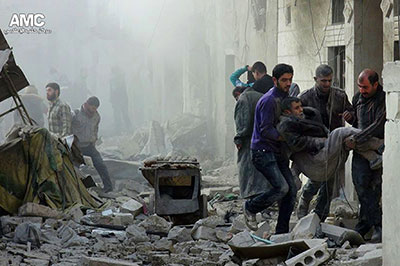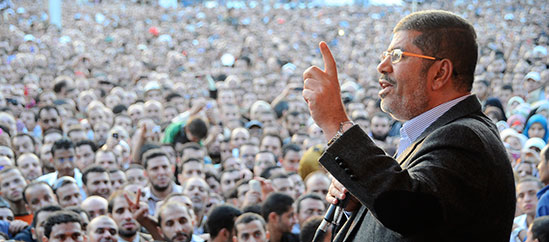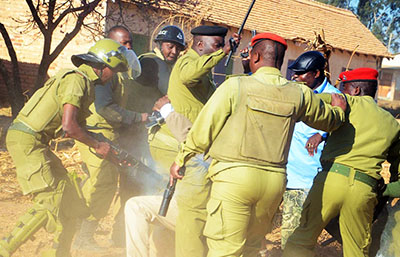The conflict in Syria, a spike in Iraqi bloodshed, and political violence in Egypt accounted for the high number of journalists killed on the job in 2013. A CPJ special report by Elana Beiser


The conflict in Syria, a spike in Iraqi bloodshed, and political violence in Egypt accounted for the high number of journalists killed on the job in 2013. A CPJ special report by Elana Beiser

For the second consecutive year, Turkey was the world’s
leading jailer of journalists, followed closely by Iran and China. The number
of journalists in prison globally decreased from a year earlier but remains
close to historical highs. A CPJ special
report by Elana Beiser

U.S. President Barack Obama came into office pledging open government, but he has fallen short of his promise. Journalists and transparency advocates say the White House curbs routine disclosure of information and deploys its own media to evade scrutiny by the press. Aggressive prosecution of leakers of classified information and broad electronic surveillance programs deter government sources from speaking to journalists. A CPJ special report by Leonard Downie Jr. with reporting by Sara Rafsky

CPJ is disturbed by the pattern of actions by the Obama administration that have chilled the flow of information on issues of great public interest, including matters of national security. The administration's war on leaks to the press through the use of secret subpoenas against news organizations, its assertion through prosecution that leaking classified documents to the press is espionage or aiding the enemy, and its increased limitations on access to information that is in the public interest -- all thwart a free and open discussion necessary to a democracy.
Hopes for press freedom were high after the 2011 revolution ousted Hosni Mubarak, led to an explosion of private media outlets, and set the country on a path to a landmark presidential election. But more than two years later, a deeply polarized Egyptian press has been battered by an array of repressive tactics, from the legal and physical intimidation of Mohamed Morsi’s tenure to the wide censorship of the new military-backed government. A CPJ special report by Sherif Mansour with reporting by Shaimaa Abu Elkhir from Cairo

By Sherif Mansour
In June 2012, three days before Mohamed Morsi was declared winner of the presidential election, Bassem Youssef, satirist and host of Egypt’s “Al-Bernameg,” defended the Muslim Brotherhood candidate during an appearance on Jon Stewart’s “The Daily Show.” He asked the U.S. audience to give democracy in Egypt a chance. So long as Morsi and the Muslim Brotherhood remained accountable to the people and respected human rights, Youssef reasoned, there was no reason they could not lead Egypt’s historic transition to democratic rule.

By Sherif Mansour
A swarm of police vehicles converged on Media Production City moments after Gen. Abdul-Fattah al-Sisi announced on July 3 that Mohamed Morsi had been ousted. The compound outside Cairo is home to nearly every TV station in Egypt, but the police were targeting five particular stations that night: the Muslim Brotherhood-run Misr25, and four pro-Morsi Islamist stations. One by one, the stations’ live coverage went off the air, while police herded and handcuffed about 200 employees, confiscated equipment, and seized cell phones. Taken to a security facility, the employees were interrogated about their associations with the Muslim Brotherhood. Most of the administrative and support workers were released in a few hours, but 22 journalists were kept for more than a day on accusations of conspiring to overthrow the regime.

The Tanzanian government enjoys good international publicity for transparency, but news of public discontent is not being heard. A spike in anti-press attacks is sowing fear and self-censorship among journalists. A CPJ special report by Tom Rhodes

Fifty-five journalists fled their homes in the past year with help from the Committee to Protect Journalists. The most common reason to go into exile was the threat of violence, such as in Somalia and Syria, two of the most deadly countries in the world for the profession. Others fled the threat of prison, especially in Iran, where the government deepened its crackdown ahead of elections. A CPJ special report by Nicole Schilit

In our special report, "Journalists in Exile," CPJ examines the issues facing journalists who are forced to flee their countries due to intimidation, threats, or fear of imprisonment.
Abdiaziz, 26, a Somali journalist exiled in Uganda, contributed to local and international media outlets before being arrested in January 2013. He was accused under Article 269 of the Somali penal code for insulting the government and spreading false evidence. His crime was interviewing the victim of an alleged rape. After the charges were thrown out and he was released from prison, he fled the country, under harassment and fearing for his safety.
Listen to the podcast on the player above, or right click here to download an MP3. (3:41)
Read CPJ's special report, "Journalists in Exile."